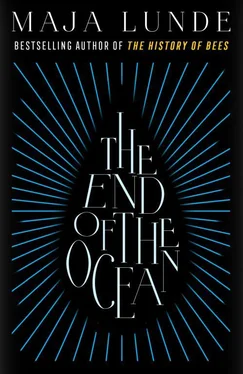“Signe—”
“And then you have to say useful . Did you forget that one?”
“It wasn’t the adjective that came to mind, but of course the falls are useful.”
“Not so much the falls in themselves, but the water that comes from them.”
“The water that comes from them is useful.”
“The falls are exceptional.”
“That too.”
I got back into the car and he did the same.
“We’re driving to the dam,” I said, without asking whether he minded. “I want to go diving.”
He didn’t say anything until we reached the mountain. We had to park the car and walk the final stretch, because the road leading to the dam was no good.
We followed the riverbed which was a dry gash in the mountain, and stopped at the top. I could sense that old feeling of something lifting, that it became easier to breathe when I no longer had to crane my neck to see the sky.
He stood there looking at the power lines that cut through the mountain landscape.
“Can I say something about this?” he asked and pointed at the huge constructions.
I smiled. “Fine.”
“The adjective I want to use is…”
“I can hardly wait.”
“Hideous.”
“That was a good choice of words.”
“I know, right? But…” He fell silent, glanced at me quickly. “Am I allowed to say that it’s also beautiful?”
“Beautiful? Where did that come from?”
“In some way or another it’s beautiful. The human grandeur. How we take on the world. It is perhaps the engineer in me that’s talking now, but it’s all of this that has lifted us out of poverty. That has made progress possible.”
At first I didn’t reply. Where was he going with this?
“Human grandeur,” I said finally. “A contradiction.”
“What?”
“A contradiction in terms. The words human and grandeur do not belong in the same sentence.”
“It must be possible to have two opposing thoughts in your head at the same time.”
“Have you ever said something like that to your father? That you think the power lines are… formidable?”
“Mom and Dad… they have actually managed just fine without that summer farm. It didn’t turn out to be the catastrophe they feared—they received compensation, it was done by the book, even he had to admit that.”
Magnus’s gaze followed the high-tension cables that were running through the mountain wilds and pointed. “This is a result of man’s ability to plan… that we are able to imagine a future, provide for ourselves, our children, our old age. And for those who will come after us. And it’s even clean. The energy is clean.”
“And for that reason we are superior to other species, because we know how to plan?”
“Like all other species, we take care of ourselves. It’s instinct,” he said.
“So what drives us? Instinct or intellect?”
He hesitated. “Both.”
“But the development of hydroelectric power is the result of intellect?”
“…Yes.”
“I would say that it’s rather a result of instinct.”
I started walking again, didn’t want to look at him any longer.
“You don’t plan enormous hydroelectric power plants instinctively,” he said and hurried to catch up with me.
“But if we agree that humans instinctively provide for themselves and their own children…” I said.
“Yes?”
“Then these developments are a result of instinct… an instinct that is faulty.”
I stared at the road in front of me. It was still just as ugly.
“Faulty?” he said.
“You say it’s in our nature to provide for our descendants,” I said. “But we are really only providing for ourselves. Ourselves and our children. At the very most, our grandchildren. We forget about those who will come after them. While we are also capable of making changes that will have an impact on hundreds of future generations, that will destroy things for everyone who comes after us. Ergo our protective instinct has malfunctioned.”
“You’re a pessimist, do you know that?”
I was walking faster now. I wanted to get away, but couldn’t stop myself from answering him. “No. I’m a determinist. There is nothing to guarantee that everything will be fine. For the human race. For the world.”
“Nothing?” he said. “Think about the Second World War…”
“We have to go back to the war, yes.” I tried to laugh, but it sounded hollow.
“Think about the post-war years, of everything we have accomplished,” he said. “Everything Europe has achieved in an incredibly short period of time. When people combined their resources.”
“That was brilliant, wasn’t it?”
“And how can you be a determinist when you want to take part in protest marches every single weekend and spend all your free time handing out fliers?”
“I said I was a determinist. I didn’t say I was logical.”
“And I say that you’re allowed to have two opposing thoughts in your head at the same time.”
He stopped, took hold of me and pulled me close to him, but I didn’t return the hug, because suddenly I could feel how angry I was.
“Signe?”
He held me.
“They are going to drain off all the water in Lake Eide,” I said. “I can’t believe we’re walking here discussing whether power lines are beautiful.”
“Yes… I know… I know. Sorry.”
“Determinism or not, we don’t own nature,” I said, and disentangled myself from his embrace. “Just like it doesn’t own us. We don’t own the water, nobody owns the water. But all the same, we persist. And even though I don’t think it will help, in the long run, I will continue taking part in protest marches and handing out fliers, as long as I have feet to carry me and hands to distribute them with.”
We stood facing one another on the road. Suddenly I wished that I was taller, because he looked at me, at my fierceness, as if all of a sudden he thought there was something strange about it. As if I were a strange and not particularly attractive animal.
“But we can,” he said calmly, “we can do what we want, Signe. That’s what makes us human beings, what distinguishes us from animals. It must be possible to think both ways at the same time, that it’s brutal, but also fantastic, that these installations make life better for thousands of us, now and for many decades into the future, that we are creating civilization.”
I was unable to say anything; there was a pressure in my chest. “You’ve been away from here for too long,” I said finally and tried to smile. “I think we have to move back, before you turn into a city boy through and through.”
“Maybe you are the one talking like a city boy… Or maybe you’ve become a city girl?” he said. “I’ve always thought that city people have a more romantic relationship to nature, that those of us who are from here actually see its utility value also.”
“Are you serious?”
I turned and walked away, while he stayed where he was.
“Signe?” He didn’t follow me, just stood there calling me, in a low and controlled voice, as if he were talking to a child. “Come on, Signe. You have to accept that we don’t agree about everything.”
I could accept our not being in agreement about everything, of course I could, but I couldn’t accept that we didn’t agree about this. So I kept walking and luckily he followed me, finally. My back must have made an impression on him, because now he tried making some rude comments—silly, harmless, trying to show me that the conversation didn’t bother him—and I pulled myself together, answered him, wanted to demonstrate the same thing, but the whole time his words kept spinning inside me, I wanted to scream, hit him on the head with my arguments, because this was a betrayal on his part, talking like this, talking like everyone else and at the same time taking the bite out of his words by making me the difficult one, the immature one, making me the one who couldn’t allow any disagreement, the uncompromising one who failed to see that there was more than one side to any issue.
Читать дальше










